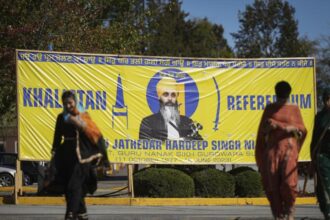In an unprecedented move that has sent ripples through the entertainment industry, Canada’s Immigration Minister Marc Miller revealed Thursday that officials are actively exploring measures to bar certain British and Irish rappers from entering the country. The potential ban targets artists with lyrics that allegedly glorify gang violence and criminal activity, marking a significant shift in Canada’s typically welcoming immigration stance.
“We’re looking at something that will specifically stop glorification of violence,” Miller stated during a press conference in Ottawa. “There are some rappers specifically from the UK and Ireland who have been implicated in very violent activity.”
The minister’s comments came in response to growing concerns about performances by artists whose music allegedly romanticizes violent street culture. While Miller declined to name specific performers under scrutiny, his remarks have ignited fierce debate about artistic expression, cultural censorship, and the boundaries of immigration policy.
Industry insiders suggest this move mirrors similar restrictions imposed by the United Kingdom on certain drill rappers and musical artists. The UK has previously banned performances by artists whose content authorities deemed could incite violence or criminal behavior, particularly following a rise in knife crime incidents in major cities.
Legal experts are questioning the implementation of such measures under Canadian immigration law. Professor Janet Davidson from the University of Toronto’s Faculty of Law told CO24 News, “Creating a category of inadmissibility based on artistic content raises serious Charter considerations regarding freedom of expression. The government would need to demonstrate a clear connection between specific performances and actual public safety threats.”
The announcement has sparked immediate backlash from civil liberties organizations and arts advocacy groups. The Canadian Civil Liberties Association issued a statement calling the proposed measures “a dangerous precedent that conflates artistic expression with criminal intent.”
Music industry representatives have also voiced concerns about economic impacts. Concert promoter Michael Reynolds noted, “UK grime and drill artists draw substantial audiences in Toronto, Montreal, and Vancouver. This would not only limit cultural exchange but potentially cost the entertainment sector millions in revenue.”
Canadian officials maintain that the prospective policy isn’t aimed at censorship but rather at addressing legitimate public safety concerns. Sources within Immigration, Refugees and Citizenship Canada indicate that officials are examining cases where performances have been linked to subsequent violence at venues or surrounding areas.
The UK’s High Commission in Ottawa has yet to comment officially on the matter, though diplomatic sources suggest this could create tension in the normally amicable Canada-UK relations.
As this policy takes shape, crucial questions remain: Where exactly will Canada draw the line between artistic expression and glorification of violence? And in an era where music easily crosses borders through digital platforms regardless of immigration restrictions, will such measures achieve their intended effect or simply limit cultural exchange while driving controversial content underground?























